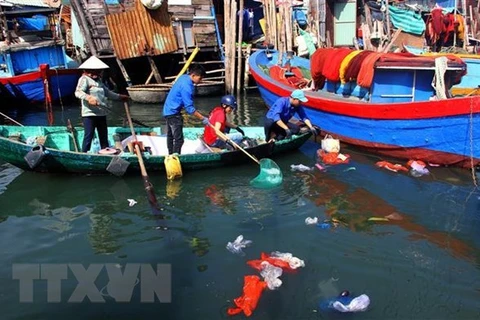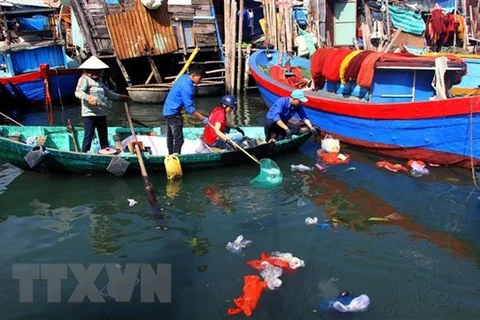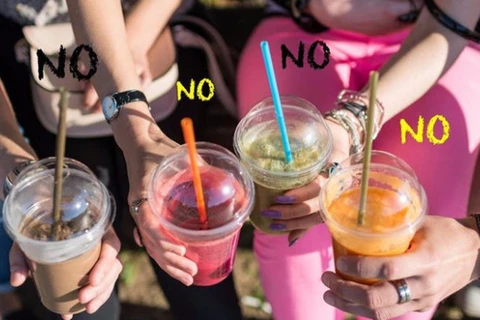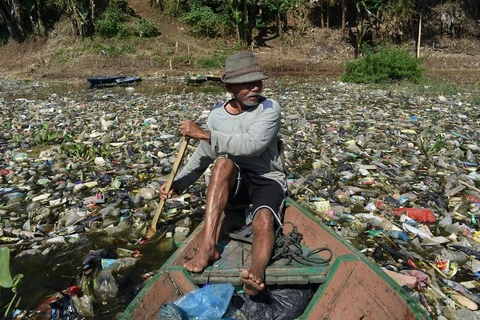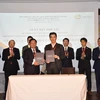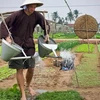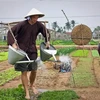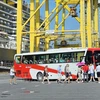Hanoi (VNA) – Vietnam’s tourism sector has launched the “Go Green” campaign in response to the movement of saying NO to plastic waste of the Ministry of Culture, Sports and Tourism.
The sector has carried out a number of programmes to make the effective use of natural resources and improve the travel and tourism competitiveness index in terms of environmental sustainability.
It has built a set of criteria for the application of tourism sustainable label “Green Lotus: for accommodation establishments in Vietnam.
Tourism services facilities are encouraged to increase the use of environmentally-friendly products such as straws and cups made of organic materials or usable for many times while limiting the use of products hard to decompose to reduce plastic waste.
The Vietnam Tourism Association and the Hanoi Tourism Association have joined hands to implement a programme protecting the environment and minimising plastic waste.
The programme aims to prevent environmental pollution in tourist sites nationwide and apply effective waste treatment measures.
Vietnam is one of Asia’s five worst polluters of ocean plastic waste, according to international organisations. With 13 million tonnes of waste released to the ocean every year, the country ranks 17th in the world for ocean plastic waste pollution.
Although there are no official statistics on the amount and varieties of plastic in the Vietnamese sea and islands, plastic waste is easy to see in Vietnamese waters, with the country’s 112 estuaries the main gateways of plastic to the ocean.
As many as 1,000 plastic bags are used each minute but only 27 percent of them are treated and recycled.
The Ministry of Natural Resources and Environment (MoNRE) estimated that about 80 tonnes of plastic waste and bags are thrown away every day in the capital city of Hanoi and the southern economic hub of Ho Chi Minh City combined.
On the positive side, Vietnam has taken efforts to manage imported plastic scrap and monitor plastic production and consumption.
In 2018, Vietnam proposed Partnerships in Environmental Management for the Seas of East Asia and launched initiatives to foster global co-operation in plastic waste reduction.
A campaign launched by the MoNRE last year delivers the message that single actions are not enough to address plastic pollution but a series of actions like plastic recycling, saying No to single plastic use and seeking alternative energy solutions can help.
As 80 per cent of plastic waste comes from the mainland, management on plastic production and consumption is of importance, according to experts. Vietnam is trying to make changes, starting with changing public behaviour.
The MoNRE aims to reduce 65 percent of non-biodegradable plastic bags used at supermarkets and shopping malls by 2020 compare to 2010. By 2026, Vietnam targets zero non-biodegradable plastic bags.
The country has studied methods to apply technology in making environmentally-friendly materials from waste.
Vietnam has recently succeeded in turning waste to energy or organic carbon – a compound used to improve soil and applied in organic agriculture.
The energy generated from waste has been used for the national grid in Ho Chi Minh City. The organic carbon soil has been certified to have higher nutrition levels than cow and chicken manure, even two times higher than organic bio-fertiliser.
Because plastic waste treatment and recycle sector plays a big role in environmental protection and renewable energy development, the State should grant preferential policies to individuals and organisations to encourage them to invest in solid waste recycling, experts suggested./.


